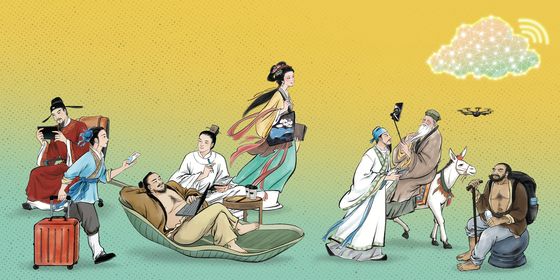Some common Chinese phrases that are actually chengyu
Choice Chengyu is a regular column, examining interesting, unique or newsworthy examples of chengyu—four-character idioms or proverbs, descended from historical and mythical events.
“I’ll eat my cue cards if the phrase 喝西北风 (‘drink the northwest wind’) is a chengyu!” host Sa Beining declared on an episode of the reality TV quiz show “Challenge the Impossible.” Yet the CCTV newscaster was soon left open-mouthed in shock after discovering that the phrase indeed qualifies as a chengyu (成语), normally four-word idioms derived from literature and fables which have often been used for centuries.
Many viewers were just as surprised as Sa, with a hashtag related to the incident receiving over 180 million views and 17,000 comments on Weibo in just a few days. One user claimed, “I feel as if I learned Chinese for all those years for nothing.” Others consoled themselves, “It’s no shame for us not to know this, since even Sa Beining, a graduate from the prestigious Peking University, did not know it.”
Sa’s assuredness was based on the fact that most chengyu sound rather refined and are used in formal situations, whereas 喝西北风 is mostly used in colloquial settings. Typical chengyu also consist of pairs of antithetical or related characters, such as in 花好月圆 (huāhǎo yuèyuán, blooming flowers and full moon).
In reality, there are a number of unique and strange sounding chengyu that don’t follow the normal patterns, and are often mistaken for proverbs or vernacular slang:
喝西北风 Drink the northwest wind
This chengyu first appeared in novel The Scholars (《儒林外史》) by Wu Jingzi (吴敬梓) from the Qing dynasty (1616 – 1911). In the book, when a captive refuses to pay a bribe to yamen runners, the yamen officials exclaim, “We care for and subsist on the mountains and waters. If all people were stingy like you, we’d have to drink the northwest wind (叫我们管山吃山,管水吃水,都象你这一毛不拔,我们喝西北风).” Since then, it has been used to describe feeling cold and hungry, or as a metaphor for poverty in general.
In those days of extreme poverty, we had nothing to eat but the northwest wind.
Nàhuìr wǒmen qióng de jiēbukāi guō, zhǐyǒu hē xīběifēng de fènr.
那会儿我们穷得揭不开锅,只有喝西北风的份儿。
加减乘除 Addition, subtraction, multiplication, and division
China’s earliest calculating tool, 算筹 (suànchóu, counting rods), can be traced back to sometime between the 11th and 8th centuries BCE. But the chengyu 加减乘除, comprising the four operations of arithmetic, was first used by Ming (1368 –1644) scholar Wang Jiusi (王九思) to indicate unpredictability: “Life should be peaceful, but who could expect the ‘addition, subtraction, multiplication, and division’ of life (端的是太平人物,谁想道命儿中加减乘除).” Today, though, it’s rarely used for this meaning and is often mistaken for a list of mathematical operations.
令人喷饭 Making someone spit out food
This chengyu originated from Northern Song (960 – 1127) scholar Su Shi’s (苏轼) description of a scene in which he was so amused by a poem that he spewed out his food at mealtime.
These remarks coming from a so-called scholar make one spit their food with laughter.
Zhèxiē huà chūzì yíwèi suǒwèi xuézhě zhī kǒu, lìngrén pēnfàn.
这些话出自一位所谓学者之口,令人喷饭。
阿猫阿狗 A random cat and dog
阿猫 (cat) and 阿狗 (dog) were common nicknames for children in ancient China, part of a practice that dates back at least to the Spring and Autumn period (770 – 476 BCE). According to folk belief, giving children humble nicknames can help them avoid evil spirits, who might be attracted by eloquent names, and thus grow up healthy.
This chengyu first appeared in Qing scholar Yu Yue’s (俞樾) work, and is now used to refer to people of little importance:
Humph! Even these nobodies are picking on me!
Hèng! Āmāo Āgǒu dōu lái zhǐzé wǒ!
哼!阿猫阿狗都来指责我!
Some netizens have complained that it is difficult to tell whether a phrase is a chengyu just by looking at it, as there are no concrete rules for chengyu composition. Some chengyu are made up of three or even up to 16 characters, rather than the usual four, such as 白日梦 (daydream), 败家子 (spendthrift), and 一山难容二虎 (“two tigers cannot live on one mountain”). This makes them almost impossible to distinguish from other idioms and proverbs.
Huang Haoran, professor of Nanjing Normal University, told Modern Express newspaper that there are different interpretations of the definition of chengyu and debate over whether some proverbs are actually chengyu. Chengyu dictionaries also get updated as language evolves. “Some chengyu do not have the same meaning when they first appeared as they do today…and some meanings disappear over time,” Huang said. “For example, ‘Addition, subtraction, multiplication, and division’ is rarely used to mean ‘changes’ nowadays, so there is no special reason to memorize [the meaning].”
Meanwhile, netizens are already speculating that in a hundred years’ time, the phrase “Sa eating cue cards” may have become a chengyu to describe the consequences of overconfidence.
Cover image courtesy of Sally Wang












